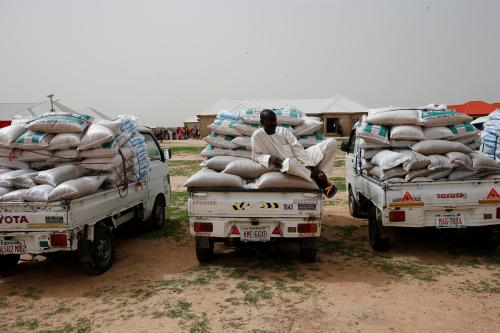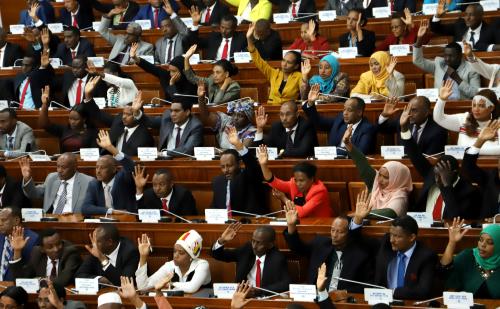Nigeria announces visa-on-arrival for all African visitors
This week, President Muhammadu Buhari of Nigeria announced that the country will grant visas on arrival to all African travelers starting in January 2020. Currently, visitors from many African countries need to apply for visas in their country of origin, which are issued upon arrival. The announcement comes amid an ongoing closure of Nigeria’s land borders with all its neighbors, which has affected trade and free movement of people within the Economic Community of West African States (ECOWAS).
At the same time, easing travel restrictions for Africans within the continent is a policy objective of the African Union. In 2019, Africans did not need a visa to travel to a quarter of other African countries, up from 20 percent in 2016 according to the Africa Visa Openness Index. Currently, Nigeria is ranked 30th on the Africa Visa Openness Index.
Ethiopia reaches agreements with IMF, World Bank for funding
On Wednesday, the IMF announced a preliminary agreement with Ethiopia on a $2.9 billion package to support ongoing economic reforms in the country. The agreement still needs to be approved by the IMF’s executive board. If signed, the three-year agreement would focus on governance at state-owned enterprises, managing debt vulnerabilities, and liberalizing the country’s exchange-rate regime among other issues.
In related news, on Friday, Prime Minister Abiy Ahmed announced on Twitter that the country had secured $3 billion in financing from the World Bank and was finalizing an additional $3 billion from other development partners including United Nations agencies. The funding from development partners is expected to focus on macroeconomic, structural, and sectoral reforms.
For more on the new ruling Prosperity Party’s new economic doctrine and its vision of a great role for the private sector in the economy, see Addisu Lashitew’s recent blog, Ethiopia’s newly unified ruling party pivots to a liberal political economy.
Rwanda signs airport deal with Qatar Airways, and South African Airways enters into business rescue
This week, the Rwandan government signed an agreement with Qatar Airways to set up a joint venture for the construction and operation of a new international airport. The Rwandan government will be a minority partner in the project with a 40 percent stake in the new company. The project, now expanded from initial plans drawn up in 2017, is expected to cost $1.3 billion. The new proposal will see the airport constructed in two phases, with capacity for 7 million passengers in Phase 1, increasing to 14 million in Phase 2, which would be completed by 2032. The agreement was signed during a three-day state visit to Rwanda by the Emir of Qatar, Tamim bin Hamad Al Thani.
In related news, late last week, the South African government announced that the national carrier, South African Airways, would enter voluntary business rescue. Under a business rescue, the company will be run by specialists with the aim of rehabilitating it. The airline has not made a profit since 2011 and has received multiple government bailouts over the past few years.






Commentary
Africa in the news: Nigeria’s visa on arrival, Ethiopia’s agreements with IMF, World Bank, and aviation update
December 14, 2019